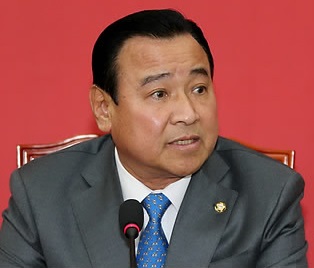- California Assembly OKs highest minimum wage in nation
- S. Korea unveils first graphic cigarette warnings
- US joins with South Korea, Japan in bid to deter North Korea
- LPGA golfer Chun In-gee finally back in action
- S. Korea won’t be top seed in final World Cup qualification round
- US men’s soccer misses 2nd straight Olympics
- US back on track in qualifying with 4-0 win over Guatemala
- High-intensity workout injuries spawn cottage industry
- CDC expands range of Zika mosquitoes into parts of Northeast
- Who knew? ‘The Walking Dead’ is helping families connect
Park nominates ruling party floor leader as new prime minister
SEOUL (Yonhap) — President Park Geun-hye nominated the ruling party’s floor leader as her new prime minister and named a group of special advisers, an official said Friday, in an apparent move to win back public trust.
Park named Lee One-koo, floor leader of the ruling Saenuri Party, to replace Prime Minister Chung Hong-won, senior presidential press secretary Yoon Doo-hyun said.
Chung will remain in the country’s No. 2 political job until Lee is confirmed by the National Assembly, where Park’s conservative party commands a majority.
“If confirmed, I will devote myself to reviving the economy,” Lee said, adding he will strengthen communication with the opposition parties and the public and speak frankly to Park on state affairs. He made the comments soon after an official announcement of his nomination.
Park picked the U.S.-educated third-term lawmaker as the nominee because he “has a deep understanding of the president’s philosophy in running state affairs and contributed to the normal operation of the National Assembly by cooperating with the opposition party,” Yoon said in a news conference.
In South Korea, the prime minister is the second-highest position after president, but the job has been limited to a largely ceremonial role as power is concentrated heavily in the president.
Park also named four special presidential advisers and three senior secretaries in charge of policy coordination, future strategy and civil affairs.
Still, Park decided to keep her chief of staff, Kim Ki-choon, for the time being, a move widely seen as a rejection of mounting public pressure to fire him over a series of incidents, including the leakage of sensitive presidential documents.
The high-profile incident has sparked a political firestorm over allegations that one of Park’s former aides tried to exert undue influence on state affairs. But the prosecution said after a preliminary investigation that a senior police officer fabricated the presidential document.
The announcement of a personnel reshuffle is widely seen as Park’s desperate attempt to try to regain public confidence in her government rocked by the document leak and a controversial tax policy.
The government’s new tax settlement scheme has sparked fierce public backlash following revelations it will require some people with an annual income of less than 55 million won (US$50,700) to pay additional taxes this year.
The public backlash apparently dragged down Park’s job approval rating to an all-time low.
Gallup Korea said 60 percent of those polled were unhappy with her job performance while 30 percent approved of the way Park has been handling her job, down from 35 percent last week.
Gallup Korea said it questioned 1,001 adults between Tuesday and Thursday, with the poll having a margin of error of plus or minus 3.1 percentage points.
Park has yet to select a nominee for the top post at the maritime ministry, which has remained vacant since December. Earlier this week, Park said she will carry out a small-scale Cabinet shake-up to refresh her team, without elaborating.
In South Korea, it has been common to conduct a Cabinet reshuffle or other personnel changes in a bid to overcome crises and start afresh with a new lineup.









![블랙핑크 로제(좌)와 제니(우) [로제 인스타그램·OA엔터테인먼트 제공. 재판매 및 DB 금지]](http://www.koreatimesus.com/wp-content/uploads/2025/04/AEN20250423001000315_02_i_P4-copy-199x223.jpg)






